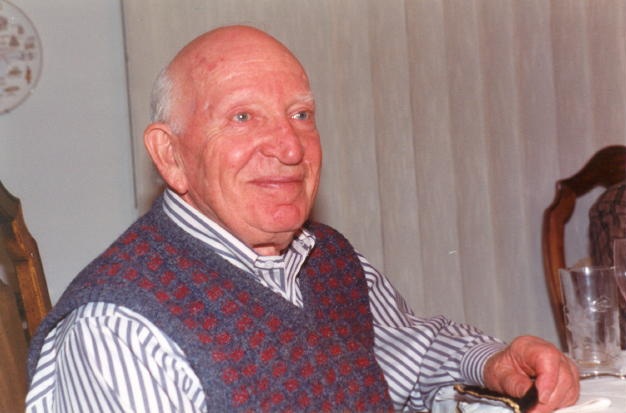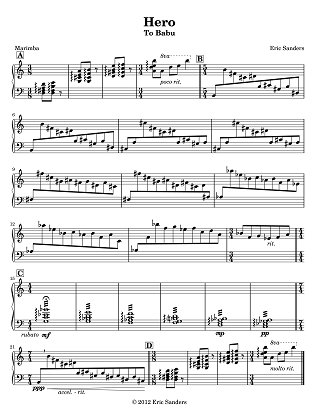Hero
I composed this short 4-mallet solo marimba piece as a tribute to my grandpa, Babu, soon after he left the planet. There are 3 main sections: intro/outro, linear/melodic and ripple rolls, with a little bit of variation within. He would have appreciated the fact that it's only 90 seconds. That said, there is a ton of meaning behind every note played.
I only had a few very basic outlines before I began to compose. Firstly, I knew I wanted it to revolve around the note B-natural for “Babu”. Secondly, there was to be a section that resembled the main motif of Bach's Cello Suite Prelude IV which I recorded this on my first CD. It was one of the few pieces Babu actually heard from the disc before he passed. Finally, I wanted a ripple roll section. Beyond that, the notes just flowed out in a contemplative improvisatory fashion.
The main sections, represent Babu's life and my life with him:
Intro: Babu as a kid.
Melodic: My life with Babu.
Rolls: When Babu got sick.
The intro sounds like anything from Debussy, to Gershwin, to early TV. The ascending line culminates in a high B-natural which is at the top of the instrument.
The melodic section is in 5/4 and has 5 phrases to it. It begins on a low B, then jumps up to a B two octaves above. The jovial intervals represent the joy Babu always brought to me as a boy and his effervescent smile.
The second phrase follows the same intervallic contour, but is decidedly sadder. Even though Babu has always been my hero, he wasn't infallible. I didn't always love the way he treated people and it was a tough lesson to learn about unconditional love.
The third phrase is my favorite of this section. Three is my favorite number and I love the French Impressionistic sound of the whole-tone scale. Unlike the first two phrases, the next three change slightly on bar 2. Otherwise, they follow the original scheme.
The fourth phrase continues the ascent toward the note “B”. However, the fifth and final phrase of this section actually ends on a Bb, the flattening signifying a portend of things to come. This last phrase is in 3/4 and ends with a ritard.
The rolls represent the end of Babu's time when he became sick. I stay on the first roll extra long, as it takes me quite a bit of time to come to terms with the fact that my grandpa was truly sick. Each roll descends along with his failing health.
The second set of rolls is a g-minor chord, which has always been one of my favorites. At this point, I need to find comfort anywhere I can. Still refusing to fully acknowledge Babu's illness, the low note from the first chord remains unmoved.
The next set of rolls mirrors Babu falling sicker. I keep the same sad sonority, but only allow myself to move down a whole step to f-minor.
The fourth chord keeps the same F in the root, as I cannot bring myself to further symbolize his declining health.
For the fifth chord I have no choice but to paint the truth and represent Babu's turn for the worse by dropping the root 2 notes, (a step and a half), to D.
The final chord drops another whole step to C. It's a fully diminished chord that not only sounds haunting and dissonant, but is awkward to play on the marimba.
I then play a solitary low B-natural, softly. This represents Babu dying peacefully and alone, the way he dictated.
Moments later I was the one to find him. He was in bed, in the den of my parents' house. The same home where I grew up and spent quality time with my grandpa, virtually every day of my entire childhood until I went away to college.
After a short pause, I reach up 2 octaves to a higher B-natural and play a decending line that is a variation of the early motif of the piece. This time I extend the bar to 7 beats, which is my favorite time signature, allowing me to spend more time with my Babu! I accelerate and ritard all the while building with a poco crescendo.
Finally, I recapitulate the intro. At the end, I ritard to show that I'm very hesitant to bury him. Of course, the piece ends with a lonely and fragile high B-natural at the top of the marimba.


